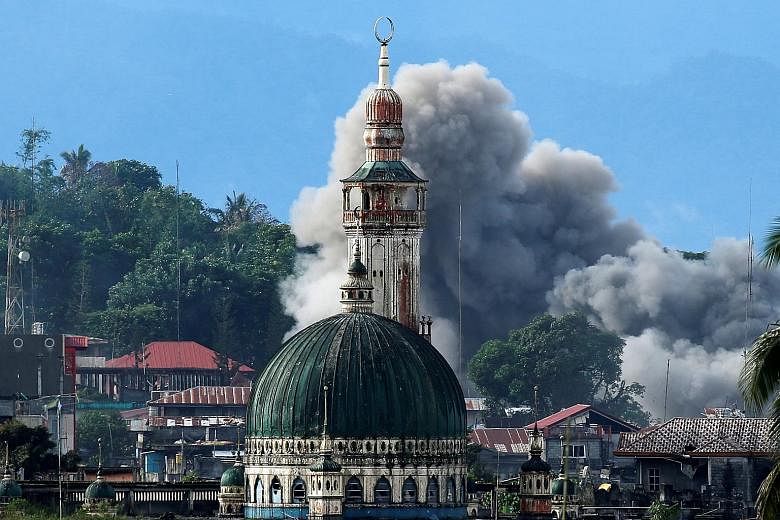With a steely gaze, Singaporean Megat Shahdan Abdul Samad calls on ISIS sympathisers around the world to make their way to East Asia and fight with militants there, in the video released last week.
He urges them to "inflict black days upon the crusaders".
Security analysts say it is a clear sign that South-east Asia is firmly in the cross hairs of ISIS and other such extremist groups.
ISIS has been losing ground in the Middle East, steadily beaten back by an international coalition. It is barely hanging on to its sole remaining stronghold of Raqqa in Syria. However, experts have long warned that the group's inevitable defeat there would not spell the end of its menace.
The latest video, part of the series titled Inside The Caliphate, shows ISIS is preparing to continue operating after being forced out of the Middle East, Professor Rohan Gunaratna of the S. Rajaratnam School of International Studies (RSIS) pointed out.
"The news should be a warning to the region of future ISIS intentions. Although ISIS is suffering in its core, it is expanding in the regions, especially those with big Muslim populations," he said.
He added that the group intends to "deepen its ideological and operational influence in South-east Asia". So there is good reason for Singapore to sit up and take notice.
It is also estimated that over 1,000 South-east Asians have travelled to the Middle East to fight for ISIS - and these battle-hardened fighters form a credible threat when they return to their homes or join existing conflicts in the region.
ISIS has already made moves in the region, a fact acknowledged by Deputy Prime Minister Teo Chee Hean on Tuesday at a security conference.
"The conflict in Marawi, South Philippines, the seizure of chemicals which can be used to make bombs in Java, and the arrest of ISIS supporters in Malaysia remind us that ISIS and its affiliates are also active in our neighbourhood," he said.
CONFLICTS IN THE REGION
In the southern Philippine city of Marawi, ISIS has established a foothold with its local affiliates, led by militants Isnilon Hapilon and the Maute brothers.
The conflict began in May, when hundreds of armed extremists flying the black ISIS flag overran the city following a disastrous attempt by security forces to arrest Hapilon.
Despite losing ground to the Philippine armed forces, militants there have defied predictions and proven difficult to root out, said RSIS senior analyst Jasminder Singh, who believes that the conflict in Marawi will continue for some time to come.
"As the Philippine government is not in a position to dislodge the pro-ISIS fighters, not only is the conflict likely to persist, there is also the danger that it may spread to other parts of Mindanao where ISIS is influential," said Mr Singh.
Even if ISIS is rooted out of Marawi, the violence will probably erupt "elsewhere in the Philippines and possibly elsewhere in South-east Asia, in the form of an attempt at a mass casualty attack", said Jakarta-based Institute for Policy Analysis of Conflict director Sidney Jones.
PROBLEMS IN RAKHINE STATE
Another area that worries security officials is the brewing crisis in Myanmar's Rakhine state, where a crackdown by the Myanmar army has left hundreds dead and sparked an exodus of over 500,000 Muslim Rohingya to Bangladesh.
The army had carried out "clearance operations" in response to attacks by Rohingya militants from the Arakan Rohingya Salvation Army (Arsa).
The fear is that refugee camps in Bangladesh could become fertile recruiting grounds for terror groups, and the conflict could also attract foreign fighters.
ISIS has routinely said, through its online publication Dabiq, that it plans to establish a base in Bangladesh to launch revenge attacks on the Myanmar government over its treatment of the Rohingya.
Other extremist groups such as Al-Qaeda already have solidarity with the Rohingya, noted retired Bangladeshi Major-General A. N. M. Muniruzzaman in an RSIS commentary last week.
Indonesian right-wing group, the Islamic Defenders Front (FPI), also opened registration for 1,200 volunteers to join the fight in Myanmar.
"The possibility of prolonged ethnic conflict in Myanmar might create a hotbed of terror as foreign fighters set eyes on the region," said General Muniruzzaman, president of the Bangladesh Institute for Peace and Security Studies.
Ms Jones pointed out that "lots of Indonesians and Malaysians would love to go and fight" in Myanmar, but there has been no channel into the country.
"It's critical to ensure that such channels don't open up in the refugee camps in Bangladesh, so the quicker there are systematic aid efforts there by experienced international agencies, the better," she said.
THREAT OF RETURNING FIGHTERS
Returning fighters from the Middle East are also likely to raise the threat level in the region, said Mr Singh.
They would be battle-hardened, fortified ideologically, and linked to a closely knit extremist network, he said.
"The sheer number of South-east Asians who have travelled to Syria and Iraq is almost more than 10 times the number that travelled to Afghanistan," he said, referring to fighters who travelled to Afghanistan in the 1980s to fight with the mujahideen against the invading Soviets.
Whether these fighters return to their home countries, go to a new combat zone, or to the southern Philippines, will be the next key threat facing the region, he said.
The recruitment of fighters foreign to the region, and radicalisation of natives here will also cause the threat level to "peak", said Prof Gunaratna, adding that security and intelligence agencies need to work together across borders.
"They need to create a common intelligence platform and share and exchange vital intelligence and learn each other's good practices to fight the growing threat," he said.


